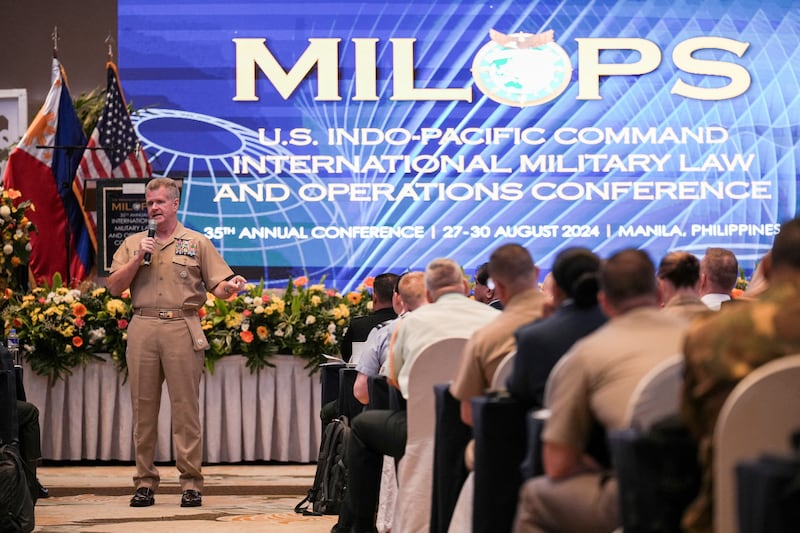China is the "biggest disruptor" to peace in Southeast Asia, the Philippines' top defense official said Tuesday, following a series of recent maritime and air confrontations between the rival territorial claimants in the South China Sea.
While speaking at a Manila forum co-hosted by his department and the U.S. military’s regional command, Philippine Defense Secretary Gilberto Teodoro Jr. accused Beijing of trying to divide member-states in the Association of Southeast Asian Nations.
“We should not allow China to define what ASEAN (Association of Southeast Asian Nations) centrality means. We should get together in ASEAN and protect each other’s sovereign rights and sovereignty while settling our internal disputes between and amongst ourselves,” Teodoro told reporters at the 35th International Military Law and Operations Conference.
“Yet what is China trying to do? [It’s] trying to break us apart and that, fortunately, will not happen because I firmly believe that our leaders realize that in this region, China – although without saying it and I’ll say it for you – is the biggest disruptor of international peace in the ASEAN region,” he said.
Beijing shot back at his remarks, saying it was the Philippines that should stop disrupting regional peace and stability by “stirring up troubles and making provocations.”
Established in 1967, ASEAN is a bloc that promotes regional stability and economic and political cooperation between and among its 10-member states: Brunei, Cambodia, Indonesia, Laos, Malaysia, Myanmar, the Philippines, Singapore, Thailand, and Vietnam. It operates on a pillar of consensus among member-states.
Apart from the Philippines, other ASEAN claimants in the potentially mineral- and gas-rich South China Sea are Brunei, Malaysia and Vietnam. Taiwan also has a claim.
Indonesia, while not a party to the broader dispute, has a separate territorial spat with China over the Natuna Islands.
The principle of centrality refers to the group's objective to make ASEAN "the primary driving force in its relations and cooperation with its external partners in a regional architecture that is open, transparent and inclusive," according to the bloc's charter.
In June, Kao Kim Hourn, the Cambodian who serves as secretary-general of ASEAN, said that Southeast Asian nations should not be compelled to have to pick sides in the geopolitical rivalry between the United States and China.
The U.S., the Philippines’ longtime defense ally, has consistently criticized Chinese naval and coast guard operations leading to standoffs with Filipino ships in South China Sea waters within Manila’s exclusive economic zone.
Some political analysts had told BenarNews that ASEAN could play a bigger role in resolving the disputes.
“[ASEAN] should live up to its mandate to try to encourage dialogue. It should use the ASEAN Regional Forum mechanisms to do confidence-building and de-escalation [to address tensions],” said Chong Ja Ian, an assistant political science professor at the National University of Singapore.
China responds
China rejected Teodoro’s comments.
"Who has kept [on] carrying out infringement activities and provocations in the South China Sea? Who has brought in forces outside the region to disrupt regional peace and stability?" Lin Jian, a spokesman for the Chinese foreign ministry, said on Tuesday.
“China is the last one that can be accused of ‘disrupting peace,’” he said.
“We urge certain people on the Philippine side to face up to the root cause of the issue, stop going down the wrong path of disrupting regional peace by stirring up troubles and making provocations, and stop the clumsy stunts of calling white black and falsely accusing China.”
The Chinese embassy in Manila did not immediately respond to BenarNews requests for comment on Teodoro’s remarks.
RELATED STORIES
[ ASEAN chief: Bloc won’t pick sides in US-China rivalryOpens in new window ]
[ Manila, Beijing eye new South China Sea ‘hotline’ to manage disputesOpens in new window ]
[ Marcos condemns Beijing’s ‘assertive’ moves in the South China SeaOpens in new window ]
[ June 17 China-Philippines clash in the South China Sea explainedOpens in new window ]
Philippine-US defense treaty
At the forum in Manila, the top U.S. commander in the region said the American military was open to the possibility of escorting Philippine ships in the waterway, depending on consultations under the Mutual Defense Treaty (MDT).
“[The] escort of one vessel to the other is an entirely reasonable option within our Mutual Defense Treaty,” said Adm. Samuel Paparo, the INDOPACOM commander.

Signed in 1951, the treaty binds both nations to come to each other’s aid during armed aggression.
Both parties in recent years have refined the treaty as covering armed attacks in the South China Sea. What constitutes armed attacks, however, is yet to be defined.
Teodoro said the treaty with Washington should be interpreted more broadly in the face of a “dynamic and cunning adversary.”
“There are ongoing conversations, not to broaden the scope of the MDT, but to broaden interpretations to make it more dynamic and not fall into China's trap of canalizing us,” he said.
Jojo Riñoza and Gerard Carreon contributed to this report from Manila.
